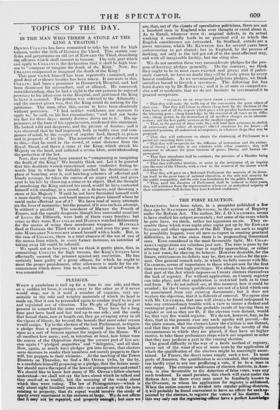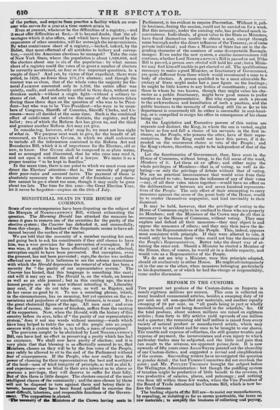THE FIRST ELECTION.
OBJECTIONS have been taken, in a pamphlet published a few days ago by SAUNDERS and BENNING, to the system of Registry under the Reform Act. The author, Mr. J. D. CHAMBERS, seems to have studied his subject accurately ; but some of the cases which he puts have, we think, rather too ingenious an air. They re- semble those which were night after night got up by Sir EDWARD SUGDEN and other opponents of' the Bill. They are such as might by possibility happen, were all men as expert in creating practical difficulties, as he who states them is in propounding theoretical ones. Even considered in the most favourable light, Mr. CRAM- BERs"S suggestions are valueless just now. The time is gone by for altering the Act ; and the time is rapidly approaching, or rather it is now come, for obeying its behests. However desirable, for the future, criticisms on its defects may be, they are useless for the pre- sent. One general remark only, in which we fully concur with Mr. CHAMBERS, seems of importance to those who are now for the first time to exercise their high privileges. We allude to his objection to that part of the Act which imposes on County electors themselves the task of registry. For without application, no County registry can take place, and that application is restricted both as to time and form. We do not indeed see, at this moment, how it could be avoided ; for the County qualifications are not of a kind which can be ascertained from any existing documents; but it does not weaken the objection, that it is difficult of removal. We agree also with Mr. CHAMBERS, that men will always be found indisposed to take any extraordinary trouble with a view to insure a distant and contingent good ; and that the probable result of leaving them to register or not as they see fit., it' the election were distant, would be, that very few would register. We do not, however, fear, as he does, that in the present ease any such apathy will prevail,—for the plain reason, that the electors know the election is not distant, and that they will be naturally stimulated by the novelty of the circumstances in which they are placed, if they have no higher motive, to take those preliminary steps which are required in order that they may perform a part in the coming election. 1 he grand difficulty in the way of a facile method of registry, arkes out of the want of one or more tests by the application of which the qualification of the electors might be unerringly ascer- tained. In France, the direct taxes supply such a test. In most parts of America, the qualification is so extended, that objections can hardly exist to any one proffering a vote, if he be a man in any shape. The extreme subdivision of election districts, in Ame- rica, is also favourable to the detection of false votes, were any such tendered. In small parishes, this check will exist under the Reform Act; for there every man must be familiarly known to the Overseer, to whom his application for registry is addressed. When the entire country is divided into regular polling-districts., if Will probably be. found convenient to have an officer for each ap- pointed by the electors, to register the voters of his district. In this way only can the registering-officer have a perfect •knowledge
'of the patties, and acquire from practice a facility which an over- seer who serves for a year at a time cannot attain to.
Even at present, whatever be the difficulties of a registry,—and it must Offer -difficulties at first,—it is beyond doubt, that the ad-
vantages which it also offers, and which have been proved by the experience of other countries, will far outweigh the inconveniences. By what contrivance short of a registry,--backed, indeed, by the Ballet, that most effectual of all antidotes to bribery and corrup- tion,—could the American ekctions be managed? Take the ease of New York State, where the population is about 1,800,000, and the electors about one in six of the population : by what means Short of a registry could the votes of so great a number of electors be correctly ascertained, on four or five important questions, in a couple of days? And yet, by virtue of that expedient, there were polled, in 1828, no fewer than 276,176 electors; and though the contest was so close, that of the whole votes the majority thr Ge- neral Jacasote amounted only to 5,350, the entire affair was quietly, coolly, and satisfactorily settled in three days, without one drunken match—without a single fight—without a solitary in- stance of riot. And not only was the sense of the electors taken during those three days on the question of who was to be Presi- dent—but who was to he Vice-President—who were to be mem-
bers of Congress, Sheriffs of Counties, Sheriffs' Clerks, and Co- roners—were all decided at the same time. Such is the combined effect of subdivision of elective districts, the registry, and the ballot ; two of which the Reform Act has given us, and the third and greatest another Reform Act may yet give. In considering, however, what may be, we must not lose sight of what is. We purpose next week to give, for the benefit of all concerned, an ELECTOR'S GUIDE, in which we shall endeavour to include all the information contained in the Reform Act and Boundaries Bill, which it is of importance for the Electors, old or new, to know. Our GUIDE shall be composed in so plain terms, and so arranged and illustrated, that he who runs may read it, and act upon it without the aid of a lawyer. We mean it as a proper treatise "to be kept in families." • In the mean time, there is one point to which we must even now direct the Electors' attention—that is, the necessity of paying their poor-rates and assessed taxes. The payment of these is absolutely necessary to the exercise of the franchise ; and there- fore cannot be gone about too soon, though it may easily be gone about too late. The time for this year—the Great Election Year, let it never be forgotten—expires on the 20th cf July.



























 Previous page
Previous page